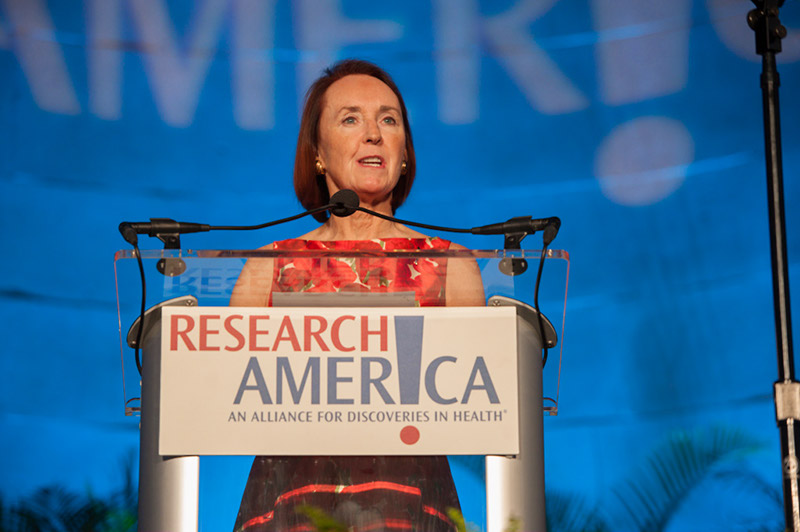Progress, Challenges, Opportunity

Dear Research Advocate,
Welcome to our last letter of 2021. It’s been a packed year; one marked by continued challenges along with strong doses of progress and opportunity. Washington is slowing down; it’s a time to gather our strength to face the year ahead with boldness and vigor.
The House and Senate adjourned for the year without enacting Build Back Better legislation or completing this year’s appropriations. We ask you to join us as we continue to urge Congress to pass FY22 appropriations as soon as possible. Today is day 83 of operating under an outdated budget. Every day without a new budget stymies lifesaving medical and public health progress.
Progress, Challenges: Even while we are frustrated by political inaction, it is important to reflect on how far we have come since December 2020, before the widespread availability of COVID-19 vaccines. This week, the U.S. will administer its 500 millionth COVID-19 vaccine. Perhaps most gratifying, many Americans have the tools and knowledge to minimize risk in gathering with family and friends, keeping in mind certain precautions (vaccines, boosters, masks, etc.).
We are also heartened by the news from the Walter Reed Army Institute of Research about progress towards a “pan-coronavirus vaccine,” further attesting to the power of research.
At the same time, our success in overcoming the challenges we face from the Omicron variant – and whatever variants succeed it – continues to be threatened by the intertwined distrust of science and government (and the exploitation of that distrust by others), leading to rejection of COVID vaccines and the dangerous vilification of public servants.
AAAS rang the alarm bells in a statement this week, condemning the latest threats against Dr. Anthony Fauci and other public health officials; we share their view and urge you to add your voice on social channels, decrying violent and sensationalist rhetoric and encouraging respect for scientists and trust in science.
Opportunity: Between now and the year’s end, as many of us see family and friends over the holidays, we may have opportunities to bolster trust in science. It is vital to be prepared to engage in civil conversations. Three resources we recommend:
- A recent article in Science provides a framework to address misinformation.
- MediaWise (Poynter’s digital media literacy program) offers 6 tips to help spot misinformation online, including practical advice to craft advanced searches and use public databases to fact-check stories and photos.
- Our October conversation with Lee McIntyre, research fellow at Boston University, furnishes productive ways of engaging with science skeptics.
Global Pandemic Context: A Nature article, “How COVID vaccines shaped 2021 in eight powerful charts,” offers a broader global and historical perspective on the immense triumph of science in saving human lives, but also spotlights the challenges ahead, particularly around vaccine inequity. It’s a strong, data-driven reminder that global health is our personal health — we are all in this together.
Oral Health in America: Twenty years ago, a report on oral health in America was released by Surgeon General David Satcher, MD, PhD, the first major report to link oral health and overall health. This week, NIH released an examination of the many oral health advances since that time as well as the recent impact of COVID-19.
Alliance Member Meeting Recap: Anticipating the congressional agenda next year, we hosted Steven Grossman, Executive Director of Alliance for a Stronger FDA, and Brent Del Monte, Principal at BGR Group, to help explain the critical importance to medical research of the reauthorization of the Prescription Drug User Fee Act (PDUFA) and its medical device counterpart. Watch this discussion and check out the Alliance for a Stronger FDA’s slides for more detail on how FDA is funded.
Upcoming Alliance Meeting: Join us on Tuesday, January 4, 11 a.m. ET, for a discussion with Neal F. Lane, PhD, Senior Fellow in Science and Technology Policy at Rice University’s Baker Institute for Public Policy. Dr. Lane will talk about his experience as a former science advisor to the President and director of the Office of Science and Technology Policy, his career journey, and what he perceives as the most important steps the U.S. can take to better deploy scientific research against existential threats.
Become a Research!American! Our Careers page lists several openings, with more to come. We’d appreciate it if you’d spread the word and share this link.
As a reminder, there will not be a letter next week. Happy holidays and best wishes for the New Year! We are grateful for your readership and, most of all, for your commitment to research advocacy.
Sincerely,
Mary Woolley




